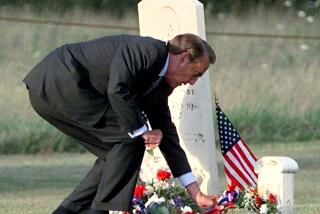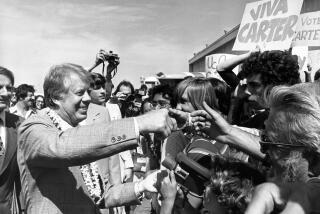Draws on Hometown Symbolism : Dole Campaign Stresses an All-American Image
- Share via
RUSSELL, Kan. — Before Sen. Bob Dole officially announced his candidacy for the Republican presidential nomination last week here in Russell, the town where he grew up, some of his advisers questioned the need to stage that event in this remote little community tucked away in northern Kansas.
But Dole’s senior political consultant, Don Devine, had a ready answer, another aide recalled. “Face it,” he said, “we’re running Russell, Kan., for President.”
Amid the warmth and enthusiasm generated by Russell’s 5,000 citizens and carried over in part to the rest of Dole’s three-day campaign kickoff tour, it was easy to see the benefits that Dole’s Russell roots bring to his candidacy.
All this seems far removed from the hard-driving, hard-bitten Republican Senate leader, who is viewed with mistrust and sometimes distaste even by some of those who admire his skills. But his strategists believe they can present a more positive picture of candidate Dole by focusing on the little town where his family struggled through the bitter times of the 1930s.
Russell--where the young Dole jerked sodas in the drugstore and earned letters on the high school track, basketball and football teams--is a paradigm of the sort of small town still idealized by many Americans, urban and rural alike.
Perhaps more important, Russell is the place to which wounded combat veteran Dole came home after World War II, his right arm and his youthful dreams shattered, and whose citizens helped him to restore his life.
“It’s the sort of story Hollywood used to make movies of in the 1940s and 1950s,” says University of Texas communications professor Kathleen Jamieson, a specialist in political rhetoric and symbolism.
And Dole and his advisers are confident that the old-fashioned script can still play very well in Peoria--and just about everywhere else in the country this campaign season.
The 64-year-old lawmaker’s down-to-earth beginnings in Russell contrast favorably with the upper-crust origins of Vice President George Bush, the Republican front-runner, the senator’s advisers believe.
They also believe that public understanding of the hard times Dole endured there, during the Great Depression and then after World War II, will help soften some of the sharp edges in the negative perception of his personality held by many who follow politics closely.
Small-Town Values
More generally, it is reasoned in the Dole camp that in a presidential campaign where candidate character traits seem to be much on the minds of the electorate, Dole’s emphasis on the enduring small-town values typified by Russell can’t help but work to his advantage.
The most direct benefit of Dole’s relationship to Russell, as he and his aides see it, is the favorable juxtaposition it provides with Bush’s background. Unlike the vice president--a senator’s son, reared in New England amid the trappings of power and wealth who has adopted a new political home in Texas--Dole’s origins are middle-class middle-American, and he still proudly claims his initial roots.
The message of his announcement speech in Russell, Dole said in an interview on his chartered Boeing 727 jet, is: “Here is a person who is successful and has a chance of being the next President and hasn’t forgotten where he is from. That’s a quality people like to see--that you don’t forget where you’re from.”
Identification Factor
Moreover, Dole said, where he is from is “sort of what it’s all about,” a place with which most voters can readily identify.
“This is where it’s at,” Dole said. “You can go to cities and get the same cross-section of people.” Then he added with an apparent allusion to Bush’s affluent background: “You don’t go to country clubs.”
Many believe that perhaps even more important than the boost that Dole’s links to Russell gives to his campaign against Bush is the help it provides him in dealing with another and possibly more formidable adversary: himself, or at least the unpleasant perception of himself that many political observers recall.
Most of these recollections are based on Dole’s performance as President Gerald R. Ford’s vice presidential running mate in the 1976 campaign. Dole was widely criticized for being excessively partisan and harsh, particularly in his nationally televised debate with his opposite number, Walter F. Mondale, in which he maligned his opponents’ motives, referred to both world wars and the Korean and Vietnam conflicts as “Democrat wars,” and was often snide and sarcastic.
Seen as Mean-Spirited
The negative impression left by that appearance--combined with the rhetorical savaging of Democrats in which Dole indulged as Republican national chairman in the early 1970s, and stories that he was an unreasonable taskmaster to his Senate staff--have fostered an impression among some Washington politicians and journalists of Dole as a mean-spirited figure, relentless in his ambition.
Not even Dole’s longtime friends and admirers or the leaders of his campaign pretend that he is really some sort of badly misunderstood Mary Poppins.
“I think he’s tougher than nails,” said Don Schnacke, a lobbyist for Kansas oil and gas producers, one of the hundreds of Dole supporters who flocked to the VFW hall in Russell for an announcement-eve barbecue. “He came up the hard way and struggled for everything he’s got.”
And Dole’s old pals, such as former Kansas GOP Chairman Max Moomaw, contend that his toughness is not without political merit. “I think people want a man who stands up for what he believes, not like Bush,” Moomaw says.
Mostly, Dole’s admirers say that when his toughness is understood in the context of his life’s experience, particularly his years in Russell, the characteristics that emerge are a blend of tough-mindedness and compassion.
‘Bare-Bones Honesty’
“There is nothing wrong with being tough,” says William E. Brock III, former secretary of labor and Dole’s campaign chairman and friend of nearly 25 years. “But there is a bare-bones honesty about all this that goes with the toughness, that goes with the compassion that makes him a great potential President.”
In broader terms, Dole’s advisers feel that as their candidate stumps the nation recounting his Russell experiences, he will strike a particularly responsive chord in a country that seems to be going through a period of moral turbulence in the way it evaluates its political leaders.
F. Morgan Williams, a Dole campaign operative who has been organizing farmers and ranchers, cited the abortive presidential candidacies of Democrats Gary Hart and Delaware Sen. Joseph R. Biden Jr., along with the recently failed Supreme Court nomination of Judge Douglas H. Ginsburg, as reflecting the current turmoil.
“In view of that kind of sentiment, Dole is going to come out very well,” Williams says. “The fact that these people (in Russell) care about him and he cares about them” will have considerable appeal to voters.
Needs Substantive Programs
But no matter how much emotional resonance Dole stirs with his message about Russell, it is clear that he needs to back up the symbolism with plans for substantive programs. “There’s a whole group of issues that he can develop,” Brock says. “That’s what a presidential campaign is all about. But you don’t do it in one speech. You do it by development of your character, your positions and your leadership style over a period of months.”
Part of Dole’s strategy is to claim that his experience in Russell makes him more appealing to a broader range of voters than his rivals--and, thus, more electable. “I will be sensitive to the needs of the left-out and the down-and-out in our society,” he promised in his announcement speech.
Indeed, the argument has found support among some of the voters who hear him. “Dole is typical of the old Southern conservative Democrats,” said Charles Meshad of Rockford, Ala., after hearing Dole speak in Atlanta. “He’s compassionate to the needy but conservative on economics.”
‘Heart for Grass-Roots’
Wanda Horsley, from Prattville, Ala., who voted for the Democratic presidential ticket in 1984, agreed. “He has conservative Republican ideas, with a heart for the grass-roots to go with them.”
With his message about his past in Russell, Dole has found a way to get the attention of the voters. But if he is going to get their support, as he himself is quick to concede, he needs to convince them that he can deliver the goods in the future.
“I’ll bet if you went out in the audience and asked people there, they’ve got to be asking themselves if the election of this candidate is going to be having any impact on me,” he said in the midst last week’s barnstorming.
“My idea is that people want somebody who can get something done.”
More to Read
Get the L.A. Times Politics newsletter
Deeply reported insights into legislation, politics and policy from Sacramento, Washington and beyond. In your inbox twice per week.
You may occasionally receive promotional content from the Los Angeles Times.










